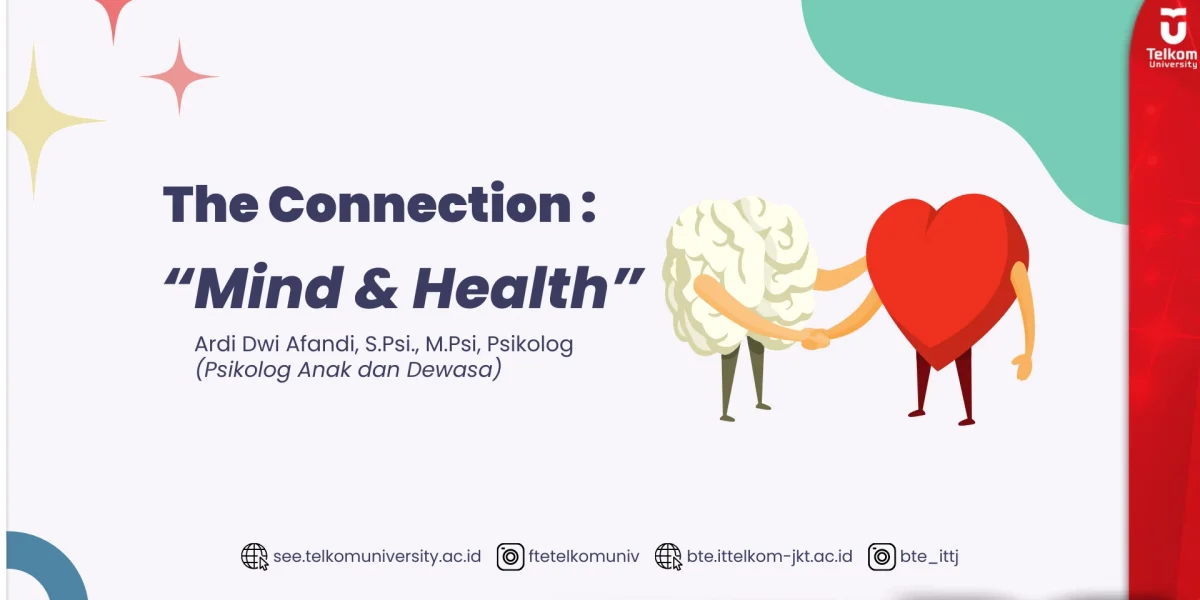BTE TEA TIME 2024: The relationship between mental and physical health
Mental and physical health are often considered as two separate things. In fact, both are closely related and influence each other. Like two sides of a coin, good mental health will have a positive impact on physical health, and vice versa. “The Connection: Mind and Health” is the theme of the second material discussed at the BTE TEA TIME 2024 activity. This material was presented by a Clinical Psychologist, Ardi Dwi Afandi, S.Psi., M.Psi, Psychologist, who has experience in various health institutions and he is now practicing at the Keisya Semplak Main Clinic, Kaya Bhakti Pratiwi Hospital. The relationship between a person’s mind (psyche), emotions, and psychology with their physical or body condition (soma) is also called Psychosomatic. This means that a person’s psychological condition can affect their physical health and vice versa, physical health can also affect psychological conditions. “Psychosomatics includes various medical conditions that are believed to have a close relationship with psychological factors, such as stress, anxiety or depression,” said Psychologist Ardi. The factors mentioned by Psychologist Ardi can also be contributing factors to medical disorders such as Insomnia (sleep disorders) and GERD (Gastroesophageal Reflux Disease). So how can psychosomatics affect GERD? Stress and anxiety can increase the production of stomach acid, thus disrupting the performance of the esophageal sphincter (an organ that functions to prevent stomach acid from returning to the esophagus). As a result, someone who experiences chronic anxiety and stress is likely to trigger an increase in GERD symptoms, such as heartburn, acid regurgitation, or chest discomfort. With the symptoms caused by psychosomatic disorders like those above, it needs to be treated with holistic treatment. Psychologist Ardi also discussed the relationship between mental health and students, where there is a condition that is often experienced by students, namely Demotivation in college. Demotivation is a condition when someone feels tired, wants to give up, and wants to stop doing a routine (especially in college). This state of demotivation affects learning. For example, becoming bored with the course and finally losing enthusiasm and not caring about the final grade and the fate of the tasks that have been done, this may happen because the student has experienced burnout and is mentally tired. In addition to psychosomatic disorders caused by the burden of lectures, students’ interpersonal relationships also greatly affect their mental health. Heartbreak or breakup often leaves sadness, loneliness, anger, and even fear. Someone who is experiencing heartbreak is also often unaware that the sadness they are experiencing has developed into depression, and this can also be a factor in demotivating students in their studies. To overcome these things, the individual concerned can do the following:
- Acknowledge the feelings of sadness experienced
- Don’t blame anyone including yourself
- Make yourself happy
- Social media detox
- Do something that was postponed
- Find a support system for yourself
- Doing things that have never been tried before
Thus maintaining a healthy mind means it will help our physical health as well. Maintaining regular eating and exercise as well as adequate sleep and rest can also be one of the important efforts in maintaining our mental and physical health. Therefore, let’s start a healthy life from now on, TelUtizen Jakarta!
Author : Siti Zakiyah | Editor : Husna Rahmi Read More : BTE TEA TIME 2024: Casual Chat About Kidney Health

